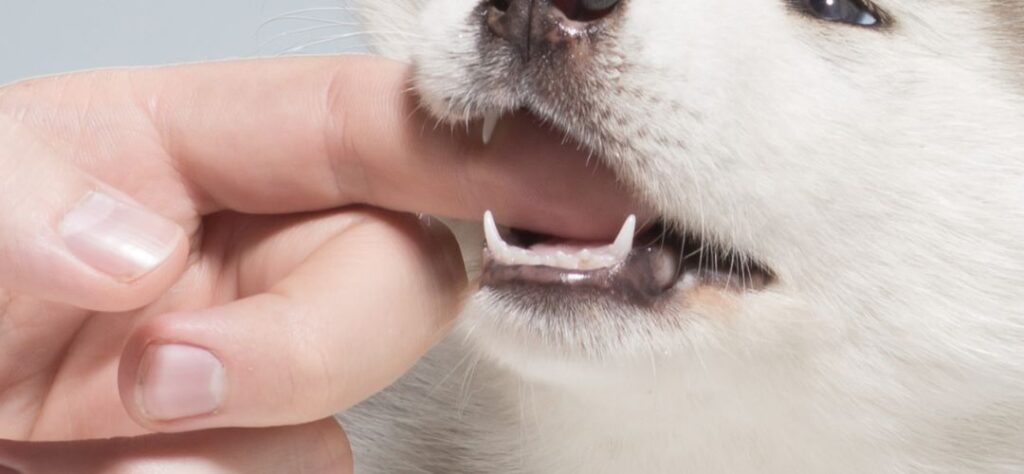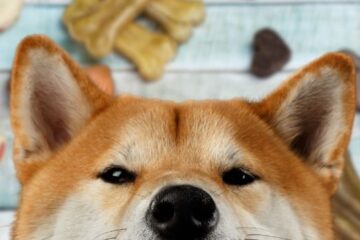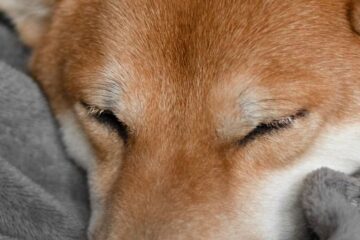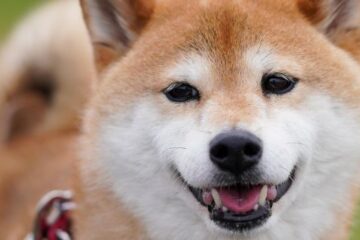If you have ever been the victim of a Shiba Inu’s love-nibbles, then you know that this is no joking matter. Shiba Inus are known for being mischievous and playful, but their bites can leave a painful memory – and an even bigger mess to clean up! So why do they do it? Read on to find out what could be causing your furry friend to bite, and what you can do about it.
Shiba Inus are naturally curious and love exploring their surroundings, so biting is a natural behavior for them. They may be trying to explore the world around them by tasting new objects or even nipping at people as a way of establishing dominance. It’s also important to note that they may bite out of fear or aggression if they feel threatened.
In addition to their natural instinctual tendencies, Shiba Inus may also be biting for attention-seeking behavior. Biting can be used as a way of demanding affection or attention from their owners. If your canine companion has been neglected or ignored, they may resort to biting in order to get the attention they crave.
No matter the reason, it’s important to address your pup’s biting behavior promptly. It is best to start off by ensuring that all necessary vaccinations are up-to-date and that your Shiba Inu is getting plenty of exercise, socialization, and mental stimulation on a daily basis. If these things are properly addressed, then this can help reduce the likelihood that your pup will resort to destructive behaviors like biting.
In addition, it is important to remain calm and patient when dealing with a Shiba Inu who bites. If he or she nips at you, try not to react in any way – instead, calmly remove yourself from the situation until they have calmed down. To further discourage this behavior, try redirecting your pup’s focus to an appropriate chew toy. This will allow them to satisfy their need for exploration and biting without having to resort to destructive behaviors.

When it comes to Shiba Inus, prevention is the best approach when it comes to dealing with unwanted biting behaviors. With the proper training and socialization, you can help ensure that your pup grows up to be a well-behaved, loving canine companion.
It is also important to note that Shiba Inus are quite intelligent and resilient animals, so if you are having trouble discouraging the biting behavior, it may be best to consult with a professional trainer or dog behaviorist for more personalized help. With their expertise and guidance, they can help you figure out the best way to tackle this issue and get your pup back on track. With a little patience and understanding, you’ll be able to turn your playful pup into a well-mannered companion in no time!
Are Shiba Inus known for biting?
Shiba Inus have earned a reputation for being independent, spirited, and sometimes even stubborn. While these traits make them truly unique animals, they can also lead to some unwanted behaviors – like biting.
Although all dogs are capable of biting if feeling threatened or provoked, Shiba Inus tend to be more prone to this type of behavior than other breeds. This is due to their strong prey drive, which can cause them to bite or nip when they see something that looks even remotely like a potential target. They may also bite if they feel overwhelmed or uncomfortable in certain situations – especially when it comes to training and socialization.
It is important to note that all dog breeds have the potential for biting behavior and it doesn’t make them any less lovable or loyal. What matters is how owners respond to and manage the situation. With consistent training and socialization, you can help your Shiba Inu learn how to better control their impulses so they don’t result in unwanted biting behavior.
Being proactive is key when it comes to managing a Shiba Inu’s biting behavior. One of the most important things is to provide your pup with plenty of positive reinforcement for good behavior and immediately redirect them whenever they start to display signs of aggression or fear. It’s also essential that you learn how to read your dog’s body language, as this will help you understand when they’re feeling uncomfortable or overwhelmed – giving you an opportunity to intervene and de-escalate the situation before it escalates to biting.
By making sure your Shiba Inu is properly socialized, exercised regularly, and given plenty of positive reinforcement for good behavior, you can help them learn how to trust people and better control their impulses – reducing the chances that they’ll bite in the future.
How strong is a Shiba Inu bite?
Although Shiba Inus tend to be smaller dogs, they have powerful jaws and can deliver a strong bite if provoked. On average, their bite pressure can reach up to 320 psi (pounds per square inch), which is on par with larger, more intimidating breeds like German Shepherds.
However, it’s important to note that the strength of a bite can vary from one individual to the next. It all comes down to two factors: breed genetics and early life experiences. A Shiba Inu’s genes will play a role in determining how strong their bite is, but so will how they’ve been socialized since puppyhood – as well as any trauma or fear-based triggers they may have encountered along the way.
For the most part, Shiba Inus aren’t known for being aggressive dogs – but that doesn’t mean they can’t be provoked into bite if given the right circumstances. To prevent this from happening, it’s essential to provide your pup with plenty of positive reinforcement to reward desired behaviors and to make sure they’re properly socialized to humans and other animals.
It’s also helpful to be aware of any signs that may indicate your pup is feeling restless, uncomfortable, or overwhelmed – giving you an opportunity to intervene and de-escalate the situation before it escalates to biting. For instance, if your Shiba Inu is exhibiting signs of stress such as yawning, panting heavily, or hiding behind furniture when guests are present, it’s best to remove them from the situation and give them time to calm down.
Ultimately, if your pup is displaying aggressive behavior due to a lack of proper socialization or fear-based triggers, it’s important to seek help from a qualified professional who can assess the situation and develop an effective plan for managing your pup’s anxiety. With the right support, you can help your furry friend lead a happy and healthy life – free of aggressive behaviors.
How do you discipline a dog to stop biting?
Discipline is an important part of keeping your pup on track and preventing them from exhibiting unwanted behaviors like biting. Here are some tips to help you effectively discipline a dog who bites:
• Set Boundaries: One of the most effective ways to stop your pup from biting is by setting clear boundaries. Establishing rules about what’s okay and what isn’t will help your pup understand what behaviors are acceptable and which ones aren’t. For example, if your dog is biting out of excitement, you can provide a gentle “no” to let them know it’s not allowed.
• Consistent Training: Positive reinforcement training can be incredibly helpful for teaching your pup proper behavior. By rewarding desired behaviors – like sitting or staying – with verbal praise, treats, or toys, you can teach them what is expected of them and help to avoid unwanted behaviors.
• Exercise: As with most animals, dogs require regular physical activity to stay healthy and happy. Providing your pup with plenty of exercise in the form of walks, runs, trips to the dog park, or playtime outside can be an effective way to help redirect their energy away from biting.
• Redirect Attention: If your pup is displaying biting behavior out of boredom, try giving them something else to focus on. Providing chew toys and interactive games can be a great way to distract them from the unwanted behavior and give them something else to do instead.
• Professional Help: In some cases, you may need to enlist the help of a professional trainer or behaviorist to help your pup learn more appropriate behaviors. A knowledgeable expert can provide personalized advice and guidance on how to effectively manage and correct unwanted behaviors.
By following these tips, you can help your Shiba Inu understand what kind of behavior is acceptable – and put an end to biting for good! With patience, consistency, and a little bit of effort on your part, you can successfully train them to be the perfect pup. Good luck!
• Don’t Punish: While it may be tempting to scold or punish a Shiba Inu for biting, this approach is generally ineffective and can actually have the opposite effect – increasing anxiety, fear, and aggression. Instead, focus on positive reinforcement to help your pup learn and practice
• Monitor Interactions: Always be mindful of how your pup interacts with others, especially children or other pets. Teaching them not to nip people or animals can help create a more harmonious home environment for everyone.
• Set Clear Rules: Establishing boundaries and expectations is key when it comes to curbing Shiba Inu biting behavior. Be sure to be clear and consistent with your rules, so they know what behaviors are expected of them.
• Provide Alternatives: If your pup is prone to nipping or biting, it could be a sign that they need something else to do with their mouths. Providing them with chew toys or treats can help redirect their destructive behavior into something more positive.
• Be Patient: Above all, be patient and understanding with your pup. Training them to stop biting can take time, and every pet learns at their own pace. With a little bit of patience and love, you can help make sure they learn not to bite – for good!
• Socialize: It’s important that your pup gets used to being around other people and animals. Introducing them to different environments and allowing them to interact with others can help make them more comfortable, which in turn can reduce biting tendencies.
• Seek Professional Help: If none of the above techniques seem to be working for your pup, it may be time to seek professional help. A certified animal behaviorist or trainer may be able to help you find the right solutions to your pup’s biting behavior.
• Reward Positive Behavior: Positive reinforcement is a great way to encourage good behavior in dogs – and Shiba Inus are no exception! Whenever they stop biting or nipping, be sure to reward them with plenty of praise and treats. Over time, this can help them learn that good behavior is worth the reward.
• Plan Ahead: Finally, it’s important to think ahead and plan for potential biting scenarios. If you know they have a tendency to nip or bite in certain situations, make sure to be prepared with some alternate activities or toys to distract them.
Do Shiba Inu bite furniture?
Shiba Inus can certainly bite furniture, especially when they are young puppies. This is a common problem that often arises due to boredom and lack of mental stimulation. Young Shiba Inus may not yet have learned how to properly control their biting behavior, so it’s important to provide them with plenty of toys and activities in order to keep them entertained and out of trouble.
If your Shiba Inu is biting furniture, it’s important to take the necessary steps to stop this behavior right away. Start by providing your pup with plenty of toys and activities that will keep them mentally and physically stimulated so they don’t resort to destructive behaviors like chewing on furniture. You can also play interactive games with your pup (such as fetch or tug-of-war) to help them burn off their excess energy.
Additionally, make sure you’re spending enough time with your pup each day and providing them with plenty of positive reinforcement and rewards when they don’t bite the furniture. This will help teach them that good behaviors are rewarded, while bad behaviors are not.
How do I get my Shiba Inu to stop biting?
Ultimately, it’s important to be patient and consistent with your pup as they learn to control their biting behavior. With the right amount of time and effort, you can help them become a well-behaved companion.
First, it’s important to provide your pup with plenty of activity and stimulation throughout the day. This can include taking walks, playing interactive games, providing a variety of toys, teaching new tricks or commands, participating in agility activities – anything that will keep them engaged and out of trouble!
Second, make sure you’re providing consistent discipline when necessary. If your pup bites something, redirect their attention to a toy or activity and provide them with immediate positive reinforcement when they stop biting. Similarly, if they’re exhibiting unacceptable behavior such as nipping or growling at someone, calmly remove them from the situation and explain why their behavior isn’t acceptable.
Finally, it’s important to reward your pup when they display good behavior. This can include verbal praise, treats, or special time with you – anything that lets them know that their good behavior is appreciated.
With patience and consistency, your pup will soon learn to control their biting behavior and make a wonderful companion!
Conclusion | Why does my Shiba Inu bite so much?
This article provides insight into why Shiba Inus may bite and explores how owners can take proactive steps to help manage the behavior. It explains that all dogs have the potential for biting, but with consistent training and socialization, owners can teach their pup to better control their impulses. Positive reinforcement is key in helping a Shiba Inu learn trust and good behavior, and it is important to also recognize and respond to signs of aggression or fear in order to avoid biting. With proper care and training, owners can help their Shiba Inu learn the behaviors needed to prevent unpleasant biting incidents.


